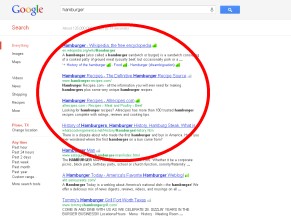The Key to Getting Found on the Web

You may have the greatest website in town, but don’t make the mistake of thinking that people will just automatically show up. It’s not like a storefront, where people can see you when they drive by. There are millions of other websites competing for attention and you must be able to drive potential customers to yours.
That’s where Search Engine Optimization (SEO) comes in to play. Google is the big name in search engines, although Yahoo! and Bing still have their fans. When you perform a search using your favorite search engine, whatever pops up near the top of the first page will most likely get your attention. These are called “organic” listings because these positions are objectively chosen by each search engine. In other words, you can’t “pay” Google to have your website show up at the top of these organic listings, although you can pay someone to optimize your site in hopes that it will rank near the top.
There are also sponsored listings at the very top or on the right side of the page, and these spots are definitely paid for. They’re also known as ads (for more on that, see PPC or Pay-Per-Click). However, a high ranking in the organic listing section is considered more trustworthy by many users since it’s not paid for. On the other hand, it takes a lot longer to achieve, often on the order of many months. Furthermore, Google is constantly changing the criteria (or “algorithm”) they use to determine the ranking, so it takes a consistent effort to have a consistently high ranking.
Unfortunately, there are very creative people out there always seeking to game the system by finding underhanded ways to achieve a high ranking. They may promise great results, and even instant results, and sometimes they might even deliver, but those results will not likely last very long. Google is pretty good at finding out those tricks, and if your site is found to use such unapproved tactics, your site may banished to the netherworlds of the internet.
As a result of all the changes that Google is constantly implementing in their algorithm, SEO has become a serious, long-term commitment to providing a useful website with lots of great content continuously being produced. Needless to say, this requires a either a sizable budget or substantial time, often both. If you’re competing against a national brand with deep pockets, you may be facing a huge challenge, depending on your industry niche.
Fortunately, if you’re a small business owner with a local market, Google has turned increasing attention on local search, which can somewhat level the playing field. You are probably better served by focusing on what’s known as Local Search Optimization (LSO) or just Local SEO. Traditional SEO has become increasingly important to Local SEO, but for the most part, we recommend “local” for your primary optimization efforts.
